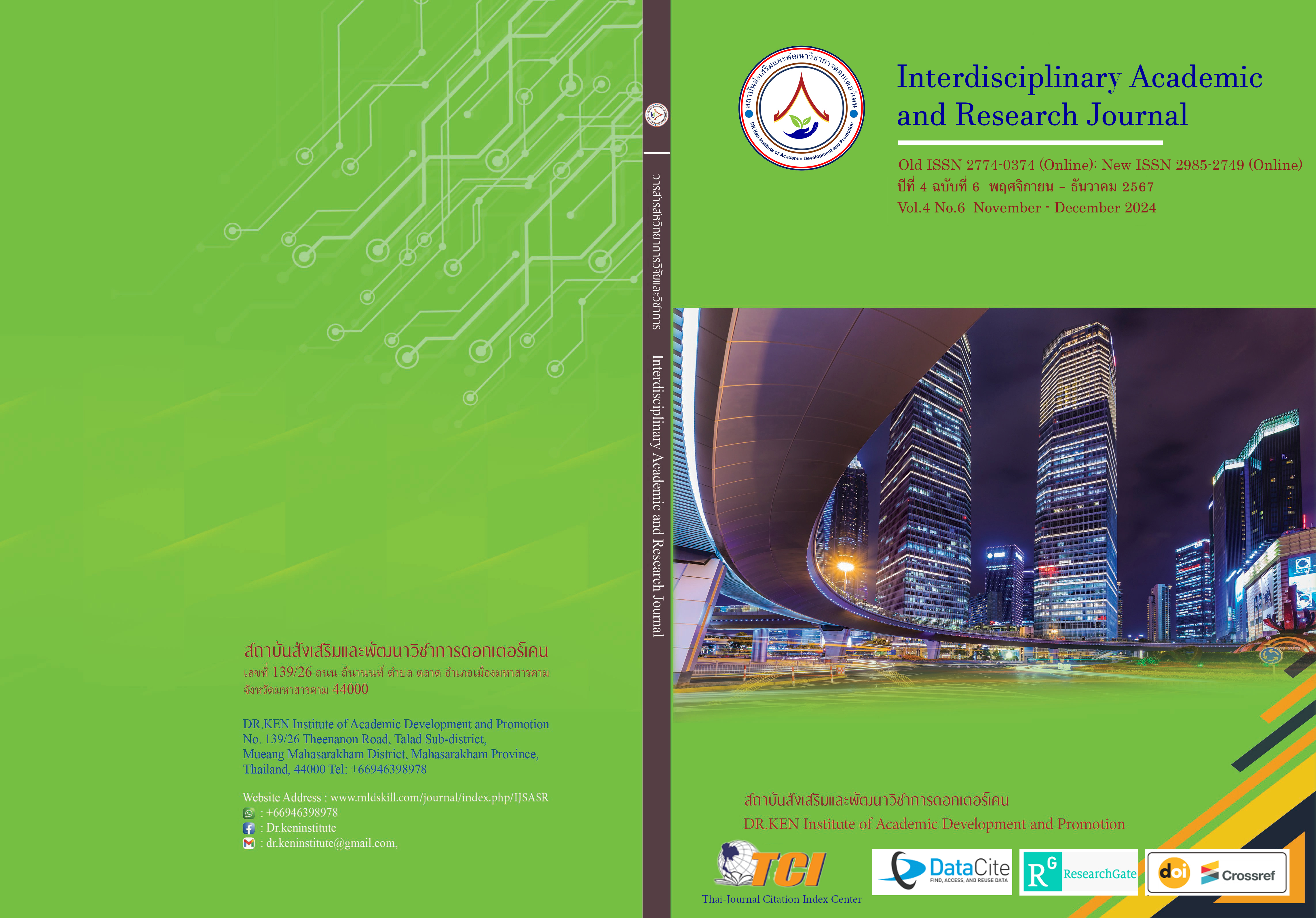Model of Informal Education Management of the Nakhon Sawan Provincial Office of Learning Encouragement According to Sankhahavatthu IV Principles
DOI:
https://doi.org/10.60027/iarj.2024.281501Keywords:
Educational Management Model, Nakhon Sawan Provincial Office of Learning, Encouragement, Sangahavatthu IVAbstract
Background and Aims: The Educational Administration of the Office of Non-Formal and Informal Education is critical to providing flexible learning opportunities, ensuring education access for diverse populations, and encouraging lifelong learning. It promotes community development by meeting educational needs outside of traditional systems. Thus, the objectives of this research Article were: 1) to study the status and make the educational management model of Nakhon Sawan Provincial Office of Learning Encouragement according to Sangahavatthu's 4 principles.
Methodology: This research applied the Mixed Methods Research having 3 steps: 1) studying the status of educational management of the Office of the Promotion of Non-Formal and Informal Education from 18 key informants with the Semi-structured Interviews and the content analysis for the data analysis, 2) making the educational management model of the Office of the Promotion of Non-Formal and Informal Education 9 key informants with the focus group discussion and the content analysis for the data analysis.
Results: 1. The status of educational management of Nakhon Sawan Provincial Office of Learning Encouragement consisted of 5components: 1) time management and planning 2) skills and self-development 3) the environment and support 4) social skills and cooperation and 5) the interest and dynamic. 2. The educational management model of Nakhon Sawan Provincial Office of Learning Encouragement according to Sangahavatthu: 4 found that: 1) the time management and planning according to Sangahavatthu 4 consisted of 6 methods, 2) the skills and self-development according to Sangahavatthu 4 consisted of 6 methods, 3) the environment and support according to Sangahavatthu 4 consisted of 4 methods, 4) the social skills and cooperation according to Sangahavatthu 4 consisted of 4 methods, and 5) the interest and dynamic according to Sangahavatthu 4 consisted of 6 methods.
Conclusion: The Nakhon Sawan Provincial Office of Learning Encouragement's educational management consists of five key components, with emphasis on time management, skill development, the environment, social cooperation, and dynamic interest. It adheres to Sangahavatthu principles, with specific methods used for each component to ensure effective educational administration.
References
กรมการศึกษานอกโรงเรียน. (2545). พระราชบัญญัติการศึกษาแหงชาติ ปพ.ศ.2542.แกไข เพิ่มเติม (ฉบับที่ 2) พ.ศ.2545. กรุงเทพฯ: บริษัทพริกหวานกร๊าฟฟค จํากัด.
กรมวิชาการ. (2544). หลักสูตรการศึกษาขั้นพื้นฐาน. พิมพครั้งที่ 2, กรุงเทพฯ: โรงพิมพองคการรับสงสินค้าและพัสดุภัณฑ
กรมสามัญศึกษา. (2543). การปฏิรูปการเรียนรู้ ผู้เรียนสำคัญที่สุด. พิมพ์ครั้งที่ 5, กรุงเทพฯ: คุรุสภา ลาดพร้าว.
กานต์ กุณาศล. (2542). การประถมศึกษา. กาญจนบุรี : สถาบันราชภัฏกาญจนบุรี.
กิตติมา ปรีดีดิลก. (2542). การบริหารและการนิเทศการศึกษาเบื้องต้น. กรุงเทพฯ: อักษรพิพัฒน์.
ชุติพงศ์ สุกป่าน. (2552). การบริหารการจัดการเรียนรู้ของผู้บริหารสถานศึกษาขั้นพื้นฐาน สังกัด สำนักงานเขตพื้นที่การศึกษานราธิวาส เขต 2. รายงานการวิจัย, บัณฑิตวิทยาลัย: มหาวิทยาลัยสุโขทัยธรรมาธิราช.
นพพล สุวรรณสุนทร. (2565). การบริหารงานตามหลักพระพุทธศาสนา. Retrieved from http://www,siace,ac,th/index,php.
นันทพร ปัญญาสูง. (2558). การบริหารงานพัฒนากระบวนการเรียนรู้ ของโรงเรียนบ้านอรุโณทัย จังหวัดเชียงใหม่. รายงานการวิจัย, บัณฑิตวิทยาลัย: มหาวิทยาลัยเชียงใหม่,
ปรียาพร วงศ์อนุตรโรจน์. (2546). การบริหารงานวิชาการ. กรุงเทพฯ: ศูนย์สื่อเสริมกรุงเทพ.
พรสวรรค์ ศิริวัฒน์. (2552). การพัฒนาครูด้านการจัดการเรียนรู้ ที่เน้นกระบวนการคิดโดยใช้หลักการบริหารวงจร PDCA โรงเรียนบ้านโชคนาสาม อำเภอปราสาท สำนักงานเขตพื้นที่การศึกษาสุรินทร์ เขต 3. รายงานการวิจัย, บัณฑิตวิทยาลัย: มหาวิทยาลัยราชภัฏสุรินทร์.
มาลี ประเสริฐเมธ. (2552). การบริหารการจัดการเรียนรู้ ที่เน้นผู้เรียนเป็นสำคัญของโรงเรียน ในอำเภอภูซาง จังหวัดพะเยา. วิทยานิพนธ์ครุศาสตรมหาบัณฑิต สาขาการบริหารการศึกษา, บัณฑิตวิทยาลัย: มหาวิทยาลัยราชภัฏเชียงราย.
ศุภาวดี ดีอินทร์. (2552). การพัฒนาแนวปฏิบัติการจัดกระบวนการเรียนรู้ของสถานศึกษาขนาดเล็ก กรณีศึกษา: โรงเรียนวัดลาดระโหง จังหวัดพระนครศรีอยุธยา. รายงานการวิจัย, บัณฑิตวิทยาลัย: มหาวิทยาลัยราชภัฏพระนครศรีอยุธยา.
สมคิด บางโม. (2544). หลักการบริหารการศึกษา. พิมพ์ครั้งที่ 4. กรุงเทพฯ : สถาบันราชภัฏพระนคร.
สำนักงานคณะกรรมการการศึกษาแห่งชาติ. (2544). แนวทางการประกันคุณภาพภายในสถานศึกษา : เพื่อพร้อมรับการประเมินภายนอก. กรุงเทพฯ: พิมพ์ดี.
สุรัฐ ศิลปะอนันต์. (2542). เส้นทางสู่ความสำเร็จของการปฏิรูปการศึกษา. กรุงเทพฯ: คุรุสภา ลาดพร้าว.
อมรชัย ตันติเมธ. (2542). การบริหารสถานศึกษาปฐมวัย. นนทบุรี: มหาวิทยาลัยสุโขทัยธรรมาธิราช.
Downloads
Published
How to Cite
Issue
Section
License
Copyright (c) 2024 Interdisciplinary Academic and Research Journal

This work is licensed under a Creative Commons Attribution-NonCommercial-NoDerivatives 4.0 International License.
Copyright on any article in the Interdisciplinary Academic and Research Journal is retained by the author(s) under the under the Creative Commons Attribution-NonCommercial-NoDerivatives 4.0 International License. Permission to use text, content, images, etc. of publication. Any user to read, download, copy, distribute, print, search, or link to the full texts of articles, crawl them for indexing, pass them as data to software, or use them for any other lawful purpose. But do not use it for commercial use or with the intent to benefit any business.
















.png)


